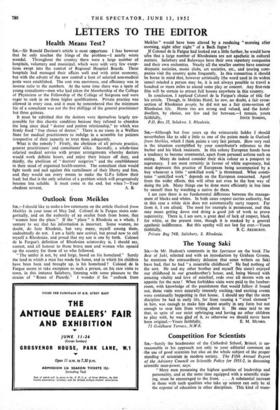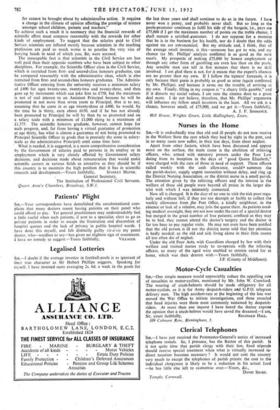Competition For Scientists
Sut„—Surely the headmaster of the Cathedral School, Bristol, is un- reasonable in his approach not only to your editorial comment on -the use of good scientists but also on the whole subject of the proper standing of scientists in modern society. The Fifth Annual Report of the Advisory Council- on Scientific Policy for 1951-2, in discussing scientific man-power, says: "More men possessing the highest qualities of leadership and personality, and at the same time equipped with a scientific train- ing, must be encouraged to the front. . . . A substantial increase in those with such qualities who take up science can only be at the expense of education in other disciplines. This kind of trans-
fer cannot be brought about by administrative action. It requires a change in the climate of opinion affecting the prestige of science Amongst school children, parents and teachers."
To achieve such a result it is necessary that the financial rewards of scientific effort must compare reasonably with the rewards for other kinds of employment. To suggest that the salaries paid to Civil Service scientists are inflated merely because scientists in the teaching profession are paid so much worse is to practise the very vice of burying heads in sand of which you, Sir, were accused.
The inescapable fact is that scientists in the Civil Service are less well paid than their opposite numbers who have been subject to other disciplines. For example, the Scientific Officer class in the Civil Service, which is recruited from first- and second-class honours graduates, can be compared reasonably with the administrative class, which is also recruited from first- and second-class honours graduates. The Adminis- trative Officer entering from the university receives a minimum salary of £400 for ages twenty-one, twenty-two and twenty-three, and then goes up by increments which can take him to £750, but the maximum is not of real interest to an Assistant Principal because he will be - promoted in not more than seven years to Principal, that is to say, assuming that he came in at age twenty-three at £400, he would, by the time he is thirty, earn about £650, and if he has not already been promoted to Principal he will by then be so promoted and on a salary scale With a minimum of £1,000 rising to a maximum of £1,375. The scientific honours graduate, however, cannot hope for such progress, and, far from having a virtual guarantee of promotion at age thirty, has what is almost a guarantee of not being promoted to Principal Scientific Officer (a grade that is Precisely the same in salary- scale as the administrative Principal) until some time later.
' What is needed, it is suggested, is a more comprehensive consideration by the Government of salaries paid to persons in its employ or in employment which is very closely affected by Government salary decisions, and decisions made about remuneration that would make scientific careers in various fields as attractive as they should be if this country is to maintain the high position that it has in scientific research and development.—Yours faithfully, STANLEY MAYNE.
General Secretary, The Institution of Professional Civil Servants. Queen Anne's Chambers, Broadway, S.W.1.



































 Previous page
Previous page